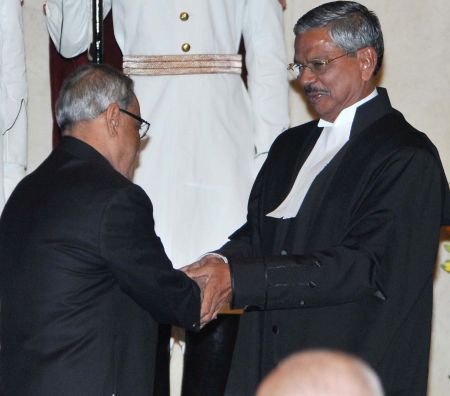
'The appointment of judges must not be under the control of the government,' lawyer Prashant Bhushan tells Syed Firdaus Ashraf/Rediff.com
Lawyer Prashant Bhushan, who appeared before the Constitution bench hearing the petitions against the National Judicial Appointments Commission Act on behalf of the Centre for Public Interest and Litigation to plead for judicial independence in matters of judges' appointments, is relieved.
With the Supreme Court striking down the NJAC Act by a 4-1 verdict, Bhushan says the government's attempt to bring the judiciary under its control, by deciding on higher judicial appointments, has ended.
The National Democratic Alliance government had, in August 2014, through the Constitution (99th Amendment) Act and the NJAC Act, brought about the commission to decide on appointments to the higher judiciary.
Unlike the collegium system it replaced, the NJAC comprised the Union law minister and two 'eminent' nominated persons.
Soon after the NJAC came into being in April, a clutch of petitions were filed against it by various organisations in the Supreme Court which decided to set up a five-judge Constitution bench to hear the matter.
On Friday, October 16, the five-judge Constitution bench struck down the NJAC as 'unconstitutional'.
How do you see the Supreme Court judgment against the NJAC Act?
There was an attempt to bring the judiciary under the government's control. That attempt has now been stopped.
The government wanted to interfere in judicial appointments and its attempt was stopped, so it is a good thing.
Is the verdict a boost for democracy?
For democracy the independence of judiciary is very important. And it means that the appointment of judges must not be under the control of the government.
Through the NJAC there was an attempt to bring the judiciary under the control of the government. This has been stopped.
But that does not mean the collegium appointment system is good and there should be no change in that. The Supreme Court itself said it will hear arguments as to what changes are needed (in the collegium system).
Has the judiciary become more powerful after this judgment?
It does, but you see the independence of the judiciary from the government is very important.
If the government interferes (in the judiciary), then it is a danger to the judiciary's independence.
However, it does not mean the current system, the way it is going, must continue in the same way. There is a need for change. There is a need for transparency. A criteria is needed as to on what basis you will select (judges). It is not there today in the collegium. We need to bring in all that.
The judiciary will indeed get more powerful after this judgment, isn't it?
The judiciary had the power. The judiciary's powers of appointment was to be finished by making this commission, and that attempt has become unsuccessful now.
For a democracy it is very essential that the judiciary, executive and legislature be separate. Why was this issue raked up in the first place?
Earlier, the appointments were with the government, then the Supreme Court gave a judgment and took the appointments into its hands, stating that if the government keeps it in its hands it would lead to compromising the independence of the judiciary.
This government was making an attempt to get its role back in judicial appointments. It was trying it through this judicial commission, but that has now been stopped.
What does the controversy over judicial appointments say of the government's intent?
The Modi government is becoming like an authoritarian, fascist government. It wants to bring all institutions under its control. It does not want any independent accountability institution. It does not want those institutions to run.
In the same way it did not allow the Lok Pal, finished off the Central Vigilance Commission, now it is finishing off the Central Information Commission. And they wanted to bring even the judiciary under its control.
In such circumstances, how do you fight the odds?
I fight for the rights of people and as much as I can fight, I always fight. I try to improve the condition of our country and society at large. I keep fighting for that.
What message do you want to give our countrymen?
The Constitution embodies the values that need to be preserved, which are the values of democracy, diversity, socialism, equality etc. Now all those values are being destroyed today.
Today we are seeing an unprecedented fascist assault on all those values and therefore it is important for people to stand up and fight for those values.
Finance Minister Arun Jaitley says all the troubles in India are only happening in the newspapers, and the reality is different.
They are only spreading lies. Modiji also said the danger is from Opposition parties who are doing polarisation.
Polarisation politics is being done by the BJP and the Sangh Parivar. The attack on dissent and the attacks on activists is being done by the BJP.
IMAGE: Justice H L Dattu after being sworn in as the Chief Justice of India.









